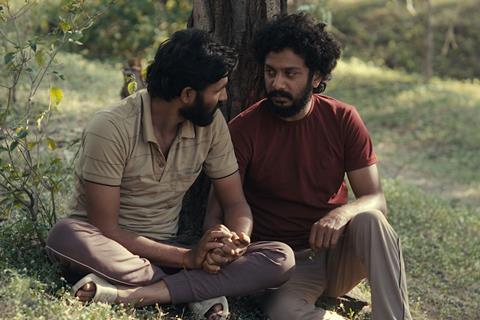A gay Indian man returns to his rural hometown in this sensitive drama

Dir/scr. Rohan Parashuram Kanawade. India/UK/Canada. 2025. 112mins
Following the death of his father, gay city-dweller Anand (Bhushaan Manoj) must return to his western Indian village of Maharashtra to observe the traditional 10-day grieving period and endure the suffocating love of his extended family. Besieged by nagging Aunties attempting to strong-arm him into marriage, Anand retreats into himself – until a connection with a childhood friend, Balya (Suraaj Suman), now a farm labourer, offers an escape. The feature debut of Rohan Parashuram Kanawade, Cactus Pears is a subdued, sensitive study of bereavement and the quietly radical act of being queer in a rural, lower-class Indian community.
Gentle empathy and richly drawn sense of place
It’s a deeply personal film for Mumbai native Kanawade, who was inspired by the loss of his own father and his experiences as a gay man. The semi-autobiographical elements extend to the location: the Marathi-language picture was shot in his mother’s tiny village of Kharshinde. And it sees Kanawade revisiting themes of queerness in contemporary rural India that he previously explored with his short films Sundar (2016) and U For Usha (2019). Although there’s a diffident dreaminess and languid pacing to Cactus Pears, its gentle empathy and richly drawn sense of place could attract specialist attention, with festival interest a given.
The film, like its central character, is notable for its quietness. With no overbearing score clamouring for attention, we are free to tune in to the cicadas and the sound of birds, a world away from the cacophonous city to which Amand longs to return. He himself speaks in a murmur, when he speaks at all. The bustling, bossy extended family barely lets him get a word in edgeways, but you sense that the option of remaining silent suits him just fine – it’s easier than the alternative of having to explain why he remains single, and he resists the suggestion of a marriage to a local girl.
Time is of the essence, says one officious Auntie. According to tradition, Anand must marry within one year of leading the mourning ritual for his father, or else he must wait for three further years before he makes a match. And, as she points out, Anand is not getting any younger. Anand’s mother who, like his late father, understands the reasons for her son’s reluctance to marry, buys him some time by claiming that he had his heart broken after being jilted by a lover. What she doesn’t mention is that the lover was a boy whose picture Anand still broods over on his phone.
So overwhelmed is Anand by the complicated rules of mourning (he must go shoeless, eat no rice or milk, take no second helping of food, eat only twice a day … the list goes on), that he has no time or space to process his grief. The intense rekindled bond with Balya, a man who shares more with Anand than their mutual memories of climbing mango trees and eating cactus pears, is a glimpse of freedom for both men. And the fields and the open skies where Balya works, a wide and airy contrast to the restricting walls and rules of the mourning ritual, finally permit Anand the opportunity to be his true self.
Production company: Lotus Visual Productions
Contact: Lotus Visual Productions vision@lotusve.com
Producers: Neeraj Churi, Mohamed Khaki, Kaushik Ray, Hareesh Reddypalli, Naren Chandavarkar, Sidharth Meer
Cinematography: Vikas Urs
Production design: Tejashree Kapadn
Editing: Anadi Athaley
Main cast: Bhushaan Manoj, Suraaj Suman, Jayshri Jagtap







![The Brightest SunScreen[Courtesy HKIFF]](https://d1nslcd7m2225b.cloudfront.net/Pictures/274x183/3/5/0/1448350_thebrightestsunscreencourtesyhkiff_312678.jpg)














![The Brightest SunScreen[Courtesy HKIFF]](https://d1nslcd7m2225b.cloudfront.net/Pictures/100x67/3/5/0/1448350_thebrightestsunscreencourtesyhkiff_312678.jpg)

